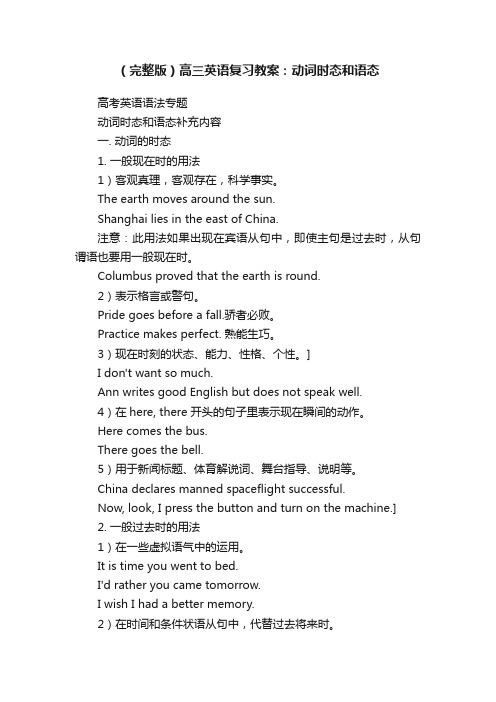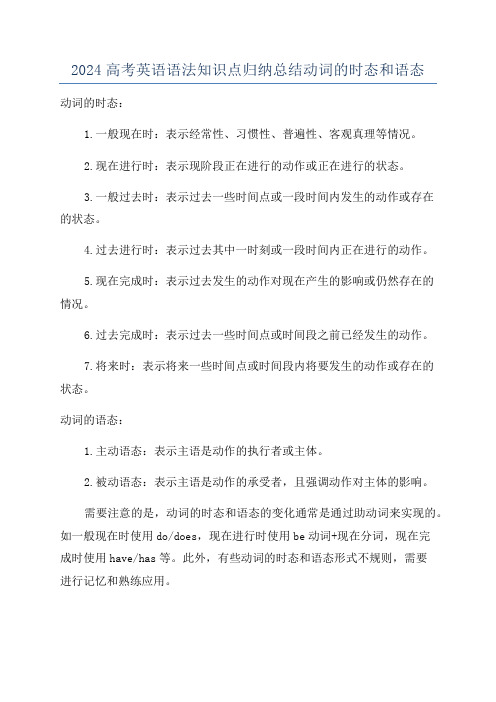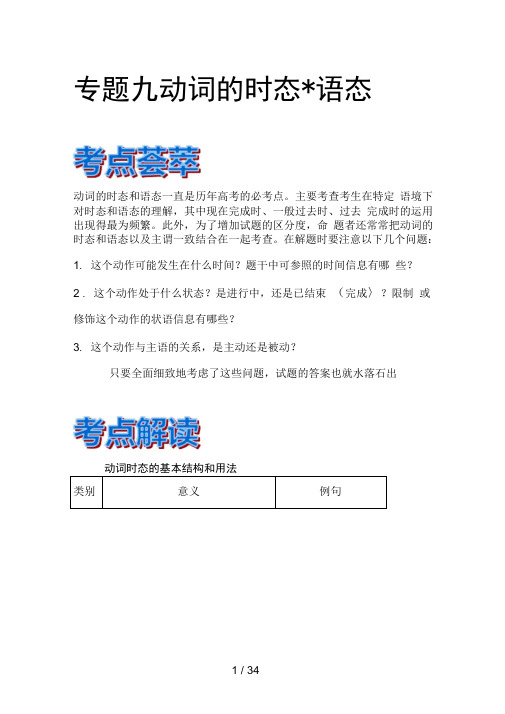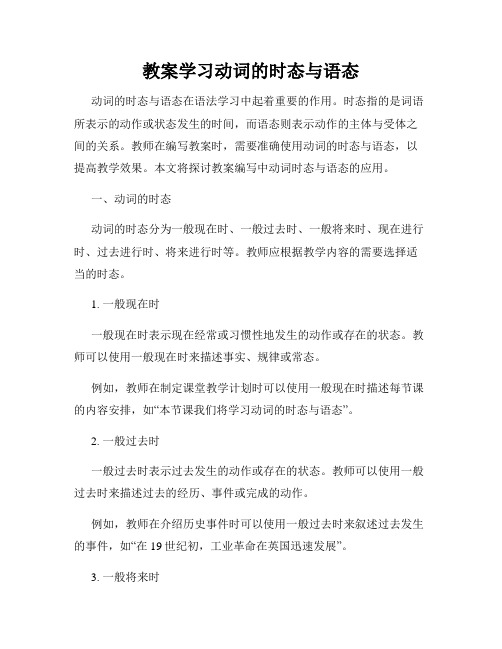高中英语语法复习学案教师版——动词的时态和语态
高三动词时态语态基础复习学案

高三一轮语法复习-动词时态、语态一、高考时态、语态必备基础知识1、时态是一种动词形式,它是“时”和“体”的组合。
“时”有现在、过去和将来之分,“体”有一般、进行、完成之别。
2、英语中的动词一般都有主动和被动两种语态。
被动语态由be+过去分词(P.P)构成,be随着主语的人称、数、时态和语气的不同而变化。
二、命题规律对时态、语态的命题侧重于考查其在特定语境中的基本用法。
三、方法突破和解题思路1、切不可脱离语境2、掌握时态的基本用法和语法规则,但不能死记硬背。
3、遵循如下解题思路该动作发生在何时(定时)→处于什么状态(完成、未完成、进行)→动词与主语关系(主动、被动)四、高考常考时态的基本用法A: 现在时态1. He (be) a student and he (study)several subjects.2. We (have) P.E. class twice a week.3. Iron (feel) hard, but cotton (feel) soft.4. The earth (travel) around the sun.5. Flight 3038 to Xia Men (fly) off at three O’clock in the a fternoon. Conclusion:1. – Is this your raincoat:?-- No, mine (hang) there behind the door.2. My brother (study) in the U.S.A. at present.3. I have won a holiday for two days to Florida. I (take) my mother.Conclusion:1. I (see) the film, so it is unnecessary for me to see it again.2. You the most beautiful that I (meet) in this world.3. This is the first time I (be) here.4. Don’t jump off until the bus (stop) completely.Conclusion:1. We (study) English for 9 years, but it will be a long way for us to go before we really mastered it.2. It (rain) for three days; no wonder the road is so muddy.Conclusion:Exercises:1. This machi ne ____. It hasn’t worked for years.A. didn’t workB. wasn’t workingC. doesn’t workD. isn’t working2. The number of deaths from heart disease will be reduced greatly if people ____ to eat more fruitand vegetables.A. PersuadeB. will persuadeC. be persuadedD. are persuaded3. Listen to the two girls by the window. What language ____?A. did they speakB. were they speakingC. are they speakingD. have they been speaking4. Ladies and gentleman, please fasten your seat belts. The plane ____.A. takes offB. is taking offC. has taken offD. took off5. My brother is an actor. He ____ in several films so far.A. appearsB. appearedC. has appearedD. is appearing6. —I’m sure Andrew will win the first prize in the final.— I think so. He ________ for it for months.A. is preparingB. was preparingC. had been preparingD. has been preparingB. 过去时态1. When I was a boy, I often (play)in that park.2. I was about to jump into the river when suddenly I (see) an old man shout to me, ―Don’t do that.‖Conclusion:1. I (do) homework this time yesterday.2. –Has Mary finished writing her novel?-- I am not sure, but she last month.3. My brother (fall) while he (ride) the bicycle.Conclusion:1. When I got to the cinema, the film (start).2. By then he (learn) English for three years.3. It was the third time that we (make) the same mistake.4. I (mean) to help you, but I was too busy at the moment.Conclusion:Exercises:1.The president hopes that the people will be better off when he quits than when he .A. has startedB. startsC. startedD. will start2. --- Jack and David are brothers. --- Oh, I ____ why they looked so alike.A. was wonderingB. wonderC. have wonderedD. will wonder3. --- What were you doing when Tony phoned you?--- I had just finished my work and ____ to take a shower.A. had startedB. startedC. have startedD. was starting4. --- Has Sam finished his homework today?--- I have no idea. He ____ it this morning.A. didB. has doneC. was doingD. had done5. --- Have you seen Michael recently?--- Yes, in fact I saw him this morning. I ____ him for two years.A. haven’t seenB. hadn’t seenC. didn’t seeD. don’t see6. Susan decided not to work on the program at home because she didn’t want her parents to know what she ____.A. has doneB. had doneC. was doingD. is doingC. 将来时态1. –Have you washed your clothes?– Sorry, I have forgotten. I (go) right now.2. The students (have) five English classes per week this term.3. Look at the clouds. It (rain).Conclusion:1. What (you do) this time tomorrow?2. I (see) Mr. Jackson tomorrow.Conclusion:1.I (finished) it by next Friday.2.By next Monday, she (study) here for three years.3. By the time the sun sets, they (work) on the farm for six hours. Conclusion:1.He said that he (wait) for us at the bus stop.2.Wherever we had troubles, he (come) to help us.Conclusion:Exercise:1. ---Did you tell Julia about the result? --- Oh, no, I forgot. I ____ her now.A. will be callingB. will callC. callD. am to call2. The mayor says that all construction work for the Brazil Olympics ____ by 2016.A. has been completedB. has completedC. will have been completedD. will have completed3. By the time Jane gets home, her aunt ____ for London to attend a meeting.A. will leaveB. leavesC. will have leftD. left4.Ken was so busy when we saw him, because he _______ a speech the next day.A. will makeB. would makeC. has madeD. was making。
(完整版)高三英语复习教案:动词时态和语态

(完整版)高三英语复习教案:动词时态和语态高考英语语法专题动词时态和语态补充内容一. 动词的时态1. 一般现在时的用法1)客观真理,客观存在,科学事实。
The earth moves around the sun.Shanghai lies in the east of China.注意:此用法如果出现在宾语从句中,即使主句是过去时,从句谓语也要用一般现在时。
Columbus proved that the earth is round.2)表示格言或警句。
Pride goes before a fall.骄者必败。
Practice makes perfect. 熟能生巧。
3)现在时刻的状态、能力、性格、个性。
]I don't want so much.Ann writes good English but does not speak well.4)在here, there 开头的句子里表示现在瞬间的动作。
Here comes the bus.There goes the bell.5)用于新闻标题、体育解说词、舞台指导、说明等。
China declares manned spaceflight successful.Now, look, I press the button and turn on the machine.]2. 一般过去时的用法1)在一些虚拟语气中的运用。
It is time you went to bed.I'd rather you came tomorrow.I wish I had a better memory.2)在时间和条件状语从句中,代替过去将来时。
Mother said I couldn’t watch TV before my homework was finished.3)情态动词could, would表示委婉语气。
Could you lend me your bike?Would you help me?4) used to do/ wouldused to do “过去常常”,表示过去习惯性的动作或状态。
高三英语一轮复习语法专题学案1:专题1 动词的时态和语态

动词的时态和语态专题知识梳理常考的各种时态的主动和被动形式时态种类主动形式被动形式一般现在时do/does is/am/are done一般过去时did was/were done一般将来时will/shall do will/shall be done过去将来时would do would be done现在进行时is/am/are doing is/am/are being done过去进行时was/were doing was/were being done现在完成时has/have done has/have been done过去完成时had done had been done现在完成进行时has/have been doing has/have been being done 将来进行时will be doing will be being done动词的时态一般现在时(1)表示经常发生的、习惯性的动作,通常用usually,often,always,sometimes,every day,once a week等作时间状语。
I usually have my hair cut once a month.The students often do their experiments in the lab.(2)表示客观真理、格言以及不受时间限制的客观存在。
The earth moves around the sun.A bird in hand is worth two in the bush.(3)表示按时间表、计划、规定发生的动作。
The train leaves at 2:35 this afternoon.(4)在主句是一般将来时的时间、条件、让步状语从句中代替将来时。
You will succeed if you try your best.Even if it rains tomorrow,the football match will take place.现在进行时(1)表示说话时正在进行的动作或存在的状态。
2024高考英语语法知识点归纳总结动词的时态和语态

2024高考英语语法知识点归纳总结动词的时态和语态
动词的时态:
1.一般现在时:表示经常性、习惯性、普遍性、客观真理等情况。
2.现在进行时:表示现阶段正在进行的动作或正在进行的状态。
3.一般过去时:表示过去一些时间点或一段时间内发生的动作或存在
的状态。
4.过去进行时:表示过去其中一时刻或一段时间内正在进行的动作。
5.现在完成时:表示过去发生的动作对现在产生的影响或仍然存在的
情况。
6.过去完成时:表示过去一些时间点或时间段之前已经发生的动作。
7.将来时:表示将来一些时间点或时间段内将要发生的动作或存在的
状态。
动词的语态:
1.主动语态:表示主语是动作的执行者或主体。
2.被动语态:表示主语是动作的承受者,且强调动作对主体的影响。
需要注意的是,动词的时态和语态的变化通常是通过助动词来实现的。
如一般现在时使用do/does,现在进行时使用be动词+现在分词,现在完
成时使用have/has等。
此外,有些动词的时态和语态形式不规则,需要
进行记忆和熟练应用。
高考英语语法精品教案:专题9动词的时态和语态

专题九动词的时态*语态动词的时态和语态一直是历年高考的必考点。
主要考查考生在特定语境下对时态和语态的理解,其中现在完成时、一般过去时、过去完成时的运用出现得最为频繁。
此外,为了增加试题的区分度,命题者还常常把动词的时态和语态以及主谓一致结合在一起考查。
在解题时要注意以下几个问题:1. 这个动作可能发生在什么时间?题干中可参照的时间信息有哪些?2 . 这个动作处于什么状态?是进行中,还是已结束(完成〉?限制或修饰这个动作的状语信息有哪些?3. 这个动作与主语的关系,是主动还是被动?只要全面细致地考虑了这些问题,试题的答案也就水落石出动词时态的基本结构和用法类别意义例句二、几种易混时态的辨析1. 一般现在时与现在进行时一般现在时表示经常性的、习惯性的或状态性的行为。
在进行时则具有进行性、未完成性和暂时性的特点。
如:On the wall hangs a picture pain ted by Qi Baishi.This is not my coat. Mine is hanging behi nd the door. 而现如:[2010 重•庆卷]The palace caught fire three times in thelast century ,and little of the original building _________ now.A.remainsB.is remainedC.is remainingD.has been remained【解读】 A 考查动词用法及时态。
remain 作不及物动词用,表示“剩下,仍有”,只能用于主动语态,不可直接跟宾语。
结合语境应用一般现在时表示现状。
2 .一般过去时和现在完成时一般过去时所表达的事件与现在无关。
而现在完成时则强调对现在的影响和结果。
如:I stayed in Beijing for five days. Then I went to America.(I am not in Beijing now. >I have stayed in Beijing for five days and haven't decided where to go next. (I am still in Beijing now and don't know where to go next.> [2010 北京卷]—I'm sorry , but I don't quite follow you. Did you say you wanted to return on September 20?—Sorry ,I ______ myself clear. We want to return on October 20.A .hadn't madeB.wouldn't makeC.don't makeD.haven't made【解读】 D 本题考查时态和情景交际。
教案学习动词的时态与语态

教案学习动词的时态与语态动词的时态与语态在语法学习中起着重要的作用。
时态指的是词语所表示的动作或状态发生的时间,而语态则表示动作的主体与受体之间的关系。
教师在编写教案时,需要准确使用动词的时态与语态,以提高教学效果。
本文将探讨教案编写中动词时态与语态的应用。
一、动词的时态动词的时态分为一般现在时、一般过去时、一般将来时、现在进行时、过去进行时、将来进行时等。
教师应根据教学内容的需要选择适当的时态。
1. 一般现在时一般现在时表示现在经常或习惯性地发生的动作或存在的状态。
教师可以使用一般现在时来描述事实、规律或常态。
例如,教师在制定课堂教学计划时可以使用一般现在时描述每节课的内容安排,如“本节课我们将学习动词的时态与语态”。
2. 一般过去时一般过去时表示过去发生的动作或存在的状态。
教师可以使用一般过去时来描述过去的经历、事件或完成的动作。
例如,教师在介绍历史事件时可以使用一般过去时来叙述过去发生的事件,如“在19世纪初,工业革命在英国迅速发展”。
3. 一般将来时一般将来时表示将来将要发生的动作或存在的状态。
教师可以使用一般将来时来表达将来的计划、安排或预测。
例如,教师在说明下一次课堂活动时可以使用一般将来时,如“下节课我们将进行小组讨论”。
4. 现在进行时现在进行时表示现在正在进行的动作。
教师可以使用现在进行时来描述目前正在进行的活动或临时的决定。
例如,教师在课堂上组织学生进行小组活动时可以使用现在进行时,如“现在我们正在讨论这个问题”。
5. 过去进行时过去进行时表示过去某个时间正在进行的动作。
教师可以使用过去进行时来描述过去的同时进行的活动。
例如,教师在复习过去的一个事件时可以使用过去进行时,如“昨天下午我正在教室里给学生上课”。
6. 将来进行时将来进行时表示将来某个时间正在进行的动作。
教师可以使用将来进行时来描述未来某个时间的同时进行的活动。
例如,教师在说明下一节课的教学安排时可以使用将来进行时,如“下周我们将进行一次实地考察”。
2019-2020年高中英语语法专题复习专题七动词时态和语态教案
2019-2020年高中英语语法专题复习专题七动词时态和语态教案一、考点聚焦1 、动词时态考查要点简述(1)一般现在时考点分析①表示客观事实或普通真理(不受时态限制)The geography teacher told us the earth moves around the sun.Water boils at 100 o C.②表示现状、性质、状态时多用系动词或状态动词;表示经常或习惯性的动作,多用动作动词,且常与表频率的时间状语连用。
Ice feels cold.We always care for each other and help each other.③表示知觉、态度、感情、某种抽象的关系或概念的词常用一般现在时:see、hear、smell、taste、feel、notice、agree、believe、like 、hate、want、think、belong seem 等。
如:I know what you mean.Smith owns a car and a house.All the students here belong to No.1 Middle School.④在时间、条件状语从句中常用一般现在时代替将来时。
但要注意由if引导的条件状语从句中可以用shall或will表“意愿”,但不表示时态。
If you will accept my invitation and e to our party, my family will be pleased. 如果你愿意接受并参加我们的舞会,我的家人会非常高兴。
⑤少数用于表示起止的动词如e、go、leave、arrive、fly、return、start、begin、pen、close、end、stop等常用一般现在时代替将来时,表示一个按规定、计划或安排要发生的动作。
当be表示根据时间或事先安排,肯定会出现的状态,只用一般现在时。
高中语法复习动词时态与语态
高中语法复习动词时态与语态高中语法复习动词时态与语态动词时态是语法中一个非常重要的概念,它用于表示动作发生的时间、状态或者程度。
同时,动词语态则用于表示主语与动作的关系。
在本文中,我们将重点复习高中语法中的动词时态与语态,帮助同学们更好地理解和运用。
一、动词时态1. 一般现在时(Simple Present Tense)一般现在时用于表示经常性、习惯性的动作、真理、普遍规律等。
它的肯定句结构为“主语+动词原型”,否定句结构为“主语+do/does+not+动词原型”,疑问句结构为“Do/Does+主语+动词原型”。
例如:- He goes to school by bus every day.(他每天坐公交车去上学。
)- They do not like playing basketball.(他们不喜欢打篮球。
)- Does she speak English?(她会说英语吗?)2. 一般过去时(Simple Past Tense)一般过去时用于表示过去某个时间发生的动作或状态。
它的肯定句结构为“主语+动词过去式”,否定句结构为“主语+did not+动词原形”,疑问句结构为“Did+主语+动词原形”。
例如:- I watched a movie last night.(昨晚我看了一场电影。
)- They did not go to the party.(他们没有参加派对。
)- Did you finish your homework?(你完成作业了吗?)3. 一般将来时(Simple Future Tense)一般将来时用于表示将来某个时间会发生的动作或状态。
它的肯定句结构为“主语+will+动词原形”,否定句结构为“主语+will not+动词原形”,疑问句结构为“Will+主语+动词原形”。
例如:- She will go to Beijing next week.(她下周将去北京。
)- We will not have a meeting tomorrow.(明天我们不开会。
动词时态和语态教案
动词时态和语态教案第一章:引言1.1 目的:让学生了解动词时态和语态的概念及其重要性。
1.2 内容:动词时态的概念和分类动词语态的概念和分类1.3 教学方法:讲授法:讲解动词时态和语态的概念及分类互动法:引导学生举例说明和练习第二章:动词的现在时态2.1 目的:让学生掌握现在时态的用法和构成。
2.2 内容:现在时态的定义和分类现在时态的构成和用法2.3 教学方法:讲授法:讲解现在时态的定义、分类和构成练习法:让学生通过练习题巩固现在时态的用法第三章:动词的过去时态3.1 目的:让学生掌握过去时态的用法和构成。
3.2 内容:过去时态的定义和分类过去时态的构成和用法3.3 教学方法:讲授法:讲解过去时态的定义、分类和构成练习法:让学生通过练习题巩固过去时态的用法第四章:动词的将来时态4.1 目的:让学生掌握将来时态的用法和构成。
4.2 内容:将来时态的定义和分类将来时态的构成和用法4.3 教学方法:讲授法:讲解将来时态的定义、分类和构成练习法:让学生通过练习题巩固将来时态的用法第五章:动词的被动语态5.1 目的:让学生掌握被动语态的用法和构成。
5.2 内容:被动语态的定义和分类被动语态的构成和用法5.3 教学方法:讲授法:讲解被动语态的定义、分类和构成练习法:让学生通过练习题巩固被动语态的用法第六章:动词的进行时态6.1 目的:让学生掌握进行时态的用法和构成。
6.2 内容:进行时态的定义和分类进行时态的构成和用法6.3 教学方法:讲授法:讲解进行时态的定义、分类和构成练习法:让学生通过练习题巩固进行时态的用法第七章:动词的完成时态7.1 目的:让学生掌握完成时态的用法和构成。
7.2 内容:完成时态的定义和分类完成时态的构成和用法7.3 教学方法:讲授法:讲解完成时态的定义、分类和构成练习法:让学生通过练习题巩固完成时态的用法第八章:动词的完成进行时态8.1 目的:让学生掌握完成进行时态的用法和构成。
高中英语语法复习学案教师版——动词的时态和语态
高中英语语法复习学案教师版——动词的时态和语态动词的时态(一)一般现在时1.Thegeographyteachertoldusthattheearthmoves(move)aroundthesun.2.Waterboils(boil)at100 ℃.3.Thecarelessdriverhasjustbeenfined$10forstoppinghiscaratasignthatreads (read)“NOPARKING”.4.Whateveryousay(say),Iwillnotchangemymind. 6.12.3.定义:过去某一时间发生的动作或所处的状态。
含有“刚才,在过去”之意,暗示现在已经不这样。
时间状语:then;atthattime;justnow;threedaysago;yesterday;when 或while 引导的表示过去的时间状语从句【总结】1.定义:将来某一时刻要发生的动作或所处的状态。
时间状语:soon;nextweek;tomorrow等2.beto+动词原形的用法:(1)YouaretodoyourhomeworkbeforeyouwatchTV.=haveto/must“必须“(2)Youaretoreportthepolice.=should/oughtto“应该”7.Selectingamobilephoneforpersonaluseisnoteasytaskbecausetechnologyischanging(change)sorapidly.8.Idon’treallyworkhere.Iamjusthelping(help)outuntilthenewsecretaryarrives.【总结】1.定义1)现在进行时:说话时或现阶段正在发生的动作或存在的状态。
2)过去进行时:过去某个时刻或阶段正在发生的动作或存在的状态。
2.时间状语1)现在进行时:now;rightnow等2)过去进行时:atthistimeyesterday等3.一个长动作为背景,被一个短动作打断,长动作用进行体,短动作用一般体。
- 1、下载文档前请自行甄别文档内容的完整性,平台不提供额外的编辑、内容补充、找答案等附加服务。
- 2、"仅部分预览"的文档,不可在线预览部分如存在完整性等问题,可反馈申请退款(可完整预览的文档不适用该条件!)。
- 3、如文档侵犯您的权益,请联系客服反馈,我们会尽快为您处理(人工客服工作时间:9:00-18:30)。
高中英语语法复习学案教师版——动词的时态和语态动词的时态一、一般体考点(一)一般现在时1. The geography teacher told us that the earth moves (move) around the sun.2. Water boils (boil) at 100 ℃.3.The careless driver has just been fined $ 10 for stopping his car at a sign that reads (read) “NO PARKING”.4. Whatever you say (say), I will not change my mind.5. Don’t try to run before you begin (begin) to walk.6. I’ll go with you if I finish (finish) my work.【总结】1.定义:表示现在的经常性、习惯性的动作或状态。
时间状语:every day; often; usually; always; seldom; sometimes2. 一般现在时可以表示客观事实或普通真理。
3. 在让步、时间和条件状语从句中以及主语是祈使句时常用一般现在时代替将来时。
(二)一般过去时1. --- Nancy is not coming tonight. --- But she promised (promise)!2. My uncle didn’t marry (marry) until he was forty-five.3. --- You haven’t said a word about my new car, Brenda. Do you like it?--- I’m sorry I didn’t say (not say) anything about it sooner. I certainly think it’s pretty on you.4. --- Come on in, Peter. I want to show you something.--- Oh, how nice of you! I never thought (think) you were (be) going to bring me a gift.5. --- Your phone number again! I didn’t catch (not catch) it. --- It’s 9598442.【总结】定义:过去某一时间发生的动作或所处的状态。
含有“刚才,在过去”之意,暗示现在已经不这样。
时间状语:then; at that time; just now; three days ago; yesterday; when 或while 引导的表示过去的时间状语从句(三)一般将来时【总结】1. 定义:将来某一时刻要发生的动作或所处的状态。
时间状语:soon; next week; tomorrow 等2. be to + 动词原形的用法:(1) You are to do your homework before you watch TV. = have to / must “必须“(2) You are to report the police. = should / ought to “应该”(3) If we are to be there before 10, we’ll have to go now. = intend / want “打算;想”(4) What are we to do next?用于第一人称疑问句中,表示征求对方意见。
(5) You are not to smoke in the room. = mustn’t “禁止”,用于否定句中(6) The news is to be found in the evening newspaper. = may / can “可以;可能”【题组训练】1. If a man is to succeed (succeed), he must work as hard as he can.2. In such dry weather, the flowers will have to watered if they are to survive (survive).3. Look at these clouds. It is going to rain (rain).4. --- You’ve left the light on. --- Oh, so I have. I will go (go) and turn it off.二、进行体考点1. As she was / is reading (read) the newspaper, Grammy fell / falls (fall) asleep.2. The reporter said that the UFO was travelling (travel) east to west when he saw (see) it.3. He is always thinking (think) of others first.4. He is always making (make) the same mistake.5. --- Have you moved into the new house. --- Not yet. The rooms are being painted (pain).6. Shirley was writing (write) a book about China last year but I don’t know whether she has finished it.7. Selecting a mobile phone for personal use is not easy task because technology is changing (change) so rapidly.8. I don’t really work here. I am just helping (help) out until the new secretary arrives.【总结】1. 定义1)现在进行时:说话时或现阶段正在发生的动作或存在的状态。
2)过去进行时:过去某个时刻或阶段正在发生的动作或存在的状态。
2. 时间状语1)现在进行时:now; right now等2)过去进行时:at this time yesterday等3. 一个长动作为背景,被一个短动作打断,长动作用进行体,短动作用一般体。
4. 进行体表示反复出现或习惯性动作,含有赞赏、厌恶、遗憾等情绪。
常与always; continually; constantly等连用。
5. 进行体表示动作的未完成性、暂时性。
三、完成体考点2(一)现在完成时1. In the past few years, great changes have taken (take) place in my hometown.2. He has been (be) busy writing a book recently.3. He has written (write) 8 books so far.4. He has already turned (turn) off the light. (the light is off now)5. Has the concert started (start) yet? (Is the concert on now?)6. I have never seen (see) the film. (I don’t know the film now)7. I will not believe you unless I have seen (see) it with my own eyes.8. I will go with you as soon as I have finished (finish) my work.9. 改错1) He has come to Beijing since last year.He has been / lived in Beijing since last year.He came to Beijing last year.2) He has joined the army for 3 years.He has served in the army for 3 years.He joined the army 3 years ago.He has been a soldier for 3 years.It is / has been three years since he joined the army.【总结】1. 定义和时间状语:1)表示一个动作或状态开始于过去,持续到现在,(也许还将持续下去)。
时间状语:lately; recently; in the last / past few years, since then; up to now; so far 等2.) 一个发生在过去的事情对现在产生的影响。
时间状语:already; just; yet; never; before 等2. 在条件、时间或让步状语从句中,表示将来某时以前已经完成的动作3. 瞬间动词用完成时态不可以接一段时间的状语瞬间动词有:come; go; get to / reach / arrive in / arrive at; leave; buy; sell; open; close; get up; join / take part in; begin / start; return; give; borrow; lend; become; turn; bring; take; die; finish / end; receive / hear form; marry; break; lose; jump(二) 过去完成时1. She had learned (learn) some English before she came to the institute.2. He said that he had been (be) around for 3 years.3. By then he had learned (learn) English for 3 years.4. Until then he had known (know) nothing about it yet.5. I had meant (mean) to help you, but I was so busy at the moment.6. I had hoped (hope) to meet Mr. Smith this morning, but I found nobody left in the room.【总结】1. 定义:一件事情发生在过去,而另外一件发生在它之前的动作用过去完成时。
